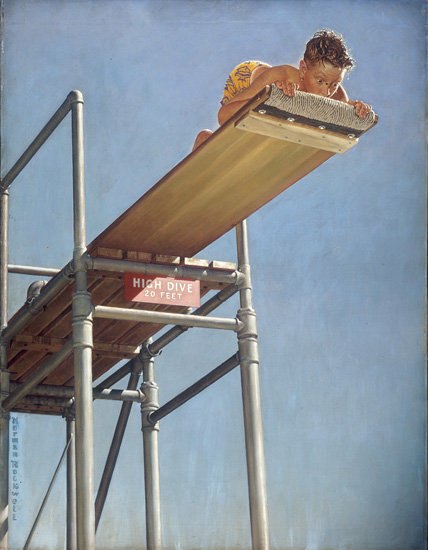Words of helpful encouragement might be really bad advice.
 My best friend - a multi-talented artist/animator/short story writer/etc. - was struggling with one of her animations. Specifically, she was having a problem with the story. Another friend and artist, who I assume was trying to be helpful, told her to drop narrative animation altogether, stick with the visuals, and “go with her strength.”
My best friend - a multi-talented artist/animator/short story writer/etc. - was struggling with one of her animations. Specifically, she was having a problem with the story. Another friend and artist, who I assume was trying to be helpful, told her to drop narrative animation altogether, stick with the visuals, and “go with her strength.”
She didn’t listen and kept wrangling the story until she turned it into an award-winning short. Ten years later, narrative animation is another one of her “strengths.”
“Go with your strength” is one of these koans that pepper self-help books. It’s fortune cookie wisdom that crumbles as soon as you look at it closely. What does it really mean? Strength in what, exactly?
- Is it your mastery of a given medium, technique, style, or genre?
- Is it the strength you presently have or is it the strength you are capable of attaining?
- Is it something that’s visible (“that’s a really strong composition”) or is it a state of mind (“you have to be tough to stay in this business”?)
- How do you know you have this strength if you never challenge it?
- Is “strength” the same as feeling good about yourself?
I’m not implying that animators have to change their unique vision or style according to whims of society (or producers). And I’m definitely not suggesting that animation must tell a story, or that there is only one way for that story to be told. I’m just wondering if animators can afford to make decisions about what to add to or eliminate from their practice based strictly on how they feel about themselves.
Here’s the problem: You have to be ready to update your knowledge and skills continually because the practice of animation is a moving target:
- Most animators journey into new territory with each film, as their questions, problems, or “what-if’s” change with each new project.
- The criteria for what makes good animation changes as the audience changes.
- The tools that you have on your desk now will have morphed into something else by the time this blog is posted.
- The media carrying your animations (do you still know any “film” makers?) will be likely thrown out next year.
- If you are an independent or experimental animator, you probably have a larger skill-set than your studio colleagues. Your list of credits may frequently have only one name, because you are the writer, director, voice actor, animator, and soundtrack artist.
In other words, animators have to be cognitively nimble and multi-skilled enough to deal with a continually changing system of audiences, products, technologies, and ways of working.
The fundamental characteristic of being an animator (and most creative professionals in the 21st century) is adapting to change. This means committing to self-motivated, life-long learning. Your past expertise expires at the start of every new project, as it gets tested by new goals and tools.
If your “strength” is measured only by what you know, or are able of doing “now,” then how will you ever adapt to change?
One way of looking at this is to think of what you may be capable of doing rather than what you are able to do. Albert Bandura termed this as “self-efficacy” in the late 1970’s, and his work continues to inform learning theory and educational research in countless fields.
Self-efficacy is the belief that you have what it takes to eventually learn what you have to learn, take the appropriate action, and spend enough time and effort to meet your goal. Self-efficacy is linked to breaking down the task into smaller, achievable steps, and learning and getting encouragement from others. Being told to give up and “go with your strength” is not encouraging.
Self-efficacy is not the same as self-confidence or self-esteem, which are general ideas about how you feel about yourself. On the contrary, self-efficacy means having the determination and persistence to learn and act in spite of the uncomfortable feeling of ignorance and self-doubt when you do something new.
In fact, self-efficacy throws out your ego, or what your feelings need. Instead, it forces you to concentrate on your project, what your art needs. Feeling that you are a genius or a loser makes it difficult to critically assess your work, your skills, or your knowledge.
In 2008, Laurent Bouzereau interviewed Steven Spielberg about Spielberg’s collection of Norman Rockwell paintings (http://eyelevel.si.edu/2010/07/steven-spielberg-on-norman-rockwell-and-t...). One of the paintings – Boy on a High Dive – hangs prominently in Spielberg’s office to remind him of the sinking feeling of self-doubt that accompanies the start of every new project….and the fact that eventually you do take that plunge.
So your “strength” had best be in making decisions based on getting the knowledge and skills needed to do the job, judging your work with criteria that you believe you can achieve, being rabidly determined and persistent, and overriding your feelings about yourself.
Or, as they say in cognitive psychology, having cojones of steel.
(For S.K.)







